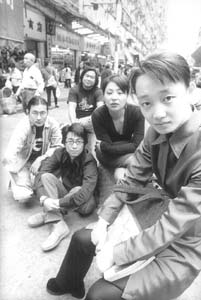![[Metroactive Movies]](/movies/gifs/movies468.gif)
[ Movies Index | Show Times | San Jose | Metroactive Central | Archives ]
Hong Kong Style
 Talking Heads: The subjects--top row, from left, Edward Chan, Louise Wong and Qi Ke Jia; bottom, left to right, Edwin Chan and Ed Wu--of Ruby Wang's documentary 'Citizen Hong Kong' face the camera.
Talking Heads: The subjects--top row, from left, Edward Chan, Louise Wong and Qi Ke Jia; bottom, left to right, Edwin Chan and Ed Wu--of Ruby Wang's documentary 'Citizen Hong Kong' face the camera.
Ruby Yang looks at the lives of five disparate citizens of Hong Kong in her new documentary IT WAS 1997, the year of the Handover. Filmmaker Ruby Yang decided to return to her childhood home in Hong Kong to see how the city had changed in the 20 years since she had left. Yang is the daughter of an exiled landowner who came to live in Kowloon; as a girl she had worked in a small artificial-flower factory her father owned. In Citizen Hong Kong, Yang turns her camera on five very different young people. What she discovers is an ambient mood of uncertainty. In her documentary, Yang profiles two young male actors who are members of the Hong Kong Theater of the Deaf; Ed Wu, a record-store clerk and rabid Star Wars fan; the cheerful Louise, a radio reporter who grew up in Australia and still has a thick accent; and central to the film, is Qi Ke Jia, a young girl who has just arrived from Nanchang with her mother and who is working herself feverishly. She's a student with a nearly full-time part-time job. As soon as we think we have these interviewees sized up, they change. Seeing Ed's plastic-wrapped assortment of Lucas trinkets, it's tempting to let one's prejudices about collector boys flare up. But Ed's a gentle misfit, ill at ease in the city and very aware of the reason for his fervent collecting: "I shop for things I like because without them my life would be empty." Ed's heart is still broken from the death of his father, with whom he was on uneasy terms. Louise, who seems a very firm, self-assured reporter, turns out to be a stranger in the city: "I have no delusions about being accepted as a local." We see the city drain the softness out of Qi--after hours of work and countless hours of study, she's transformed from a Mandarin-speaking country girl into a tough, competitive young woman with the nom de Kong, Kiki. One thing you learn from Yang's documentary is how little Wong Kar-Wai (director of Chungking Express) exaggerates the lovelorn mood of Hong Kong; relationships break down fast under the pressure of too much work and not enough room. There's a scene that would be an ornament to one of Kar-Wai's films: as Ed and Louise walk down one of those gaudy neon boulevards, Louise remembers doing a report on Durex, the contraceptive company. Supposedly, there's less sex in Hong Kong than any place in the world, she says. The gears of this enormous mill of a city slow down during the year of the Handover. Yang includes many scenes of visits to temples, where sons and daughters burn incense for their ancestors. Louise puts it well: 1997 was a historical year in the sense that all the citizens of Hong Kong stopped to think of their history and their identity. As the city was uprooted, they were forced to make a certain peace with the past. Yang's study is fascinating, lovely and often poignant; at 90 minutes long, it's dense as a miniseries. Citizen Hong Kong (Unrated; 90 min.), a documentary by Ruby Yang. [ San Jose | Metroactive Central | Archives ]
|
From the July 1-7, 1999 issue of Metro, Silicon Valley's Weekly Newspaper.
Copyright © 1999 Metro Publishing Inc. Metroactive is affiliated with the Boulevards Network.
For more information about the San Jose/Silicon Valley area, visit sanjose.com.